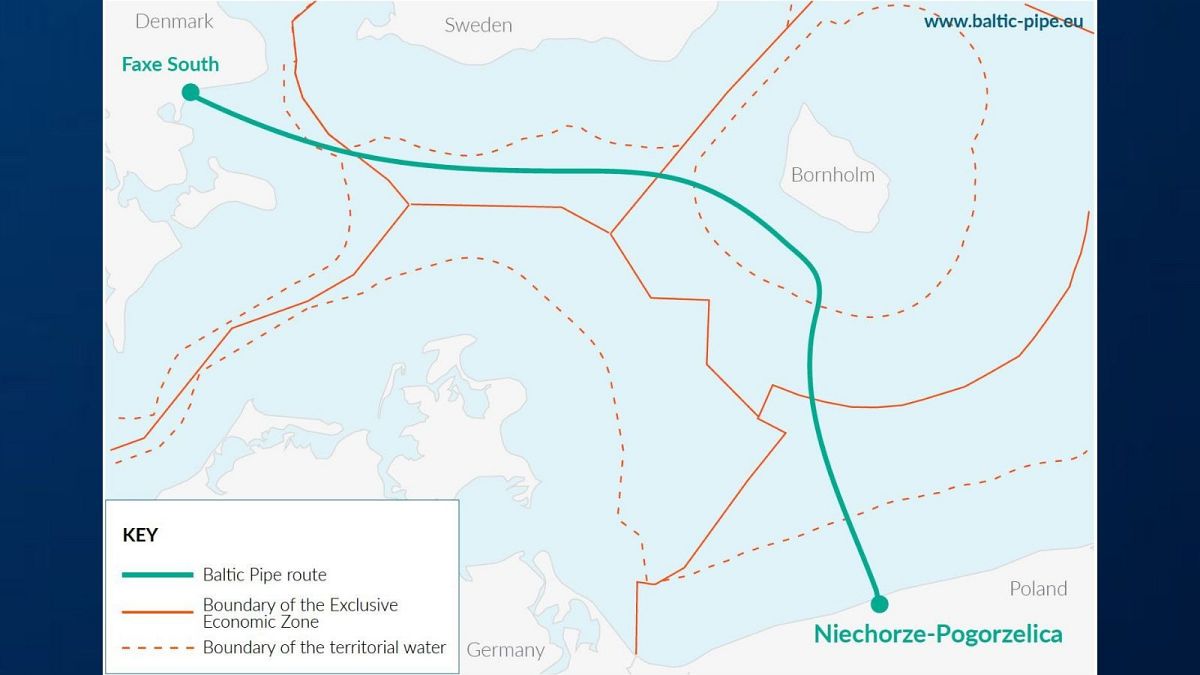Poland imports most of its natural gas from Russia and the new pipeline has been hailed in Warsaw as a way of reducing dependence on Moscow.
A major project to transport natural gas from the North Sea to Denmark and Poland has taken a significant step forward.
On Monday, Italian firm Saipem signed a deal worth €280 million to build a gas pipeline under the Baltic Sea to connect the two countries.
Poland imports most of its natural gas from Russia and the new pipeline has been hailed in Warsaw as a way of reducing dependence on Moscow.
The EU has provided €215 million in funding for the Baltic Pipe Project, which will also allow Poland to supply gas to the Danish market.
Poland's president, Andrzej Duda, has said the pipeline is scheduled to be launched on October 1, 2022.
"This is indeed very good news for Poland, and not only in the near future, but I deeply believe for decades," said Duda at a press conference on Monday.
"If we are talking about full diversification of gas supplies to Poland, if we are talking about full independence of Poland as a recipient from Russia, this is the milestone on the road to this non-dependence," he added.
From Norway to Poland, via Denmark
The Baltic Pipe Project will be constructed to link gas fields on the Norwegian shelf in the North Sea to Niechorze-Pogorzelica on the north Polish coast.
The total section underneath the Baltic Sea between Poland and Denmark is around 275 kilometres long, according to Saipem.
The Baltic Pipe Project says the building of the pipeline will contribute to reducing carbon dioxide emissions and improving air quality in Poland.
Saipem is expected to commence work in Poland and Denmark in the second half of this year. The laying of offshore pipes is later planned for the summer of 2021.
The new agreement was announced, despite a crash in the price of oil and gas in recent weeks during the coronavirus pandemic.
What does this mean for Russia and the Nord Stream?
Constructors of the Baltic Pipe say the project is "entirely different" from Nord Stream 2, another natural gas pipeline that connects Russia and Germany across the Baltic Sea.
But the announcement by Warsaw does appear to signal Poland's intentions of becoming a regional gas hub for Europe.
The capacity of the new pipeline will be 10 billion cubic metres each year, which reportedly exceeds Poland's domestic needs.
Poland still imports most of its natural gas from Russia, but has taken steps to reduce that dependence to avoid extending their long-term deal with the Russian company, Gazprom, which is scheduled to expire in 2022.
Duda said the Polish-Danish-Norwegian project, which has a total cost of €1.6 billion, will also supply gas to other countries in Central and Eastern Europe, such as Ukraine, easing its dependence on Russian gas.
Furthermore, the Baltic Pipe could serve as a key link of the north-south corridor in the European Union, as part of the Three Seas Initiative.
Meanwhile, the controversial Nord Stream 2 pipeline was designed by Moscow to increase gas supplies to Germany, Russia's biggest energy customer.
The project was just weeks away from completion in 2019, before US sanctions threatened to halt work on the last remaining section in Danish waters.
Last week, a Russian vessel anchored in Kaliningrad after sailing for three months from the Pacific to help finish construction.
Russia’s energy ministry said in December that the Gazprom pipeline was expected to be launched before the end of 2020.
